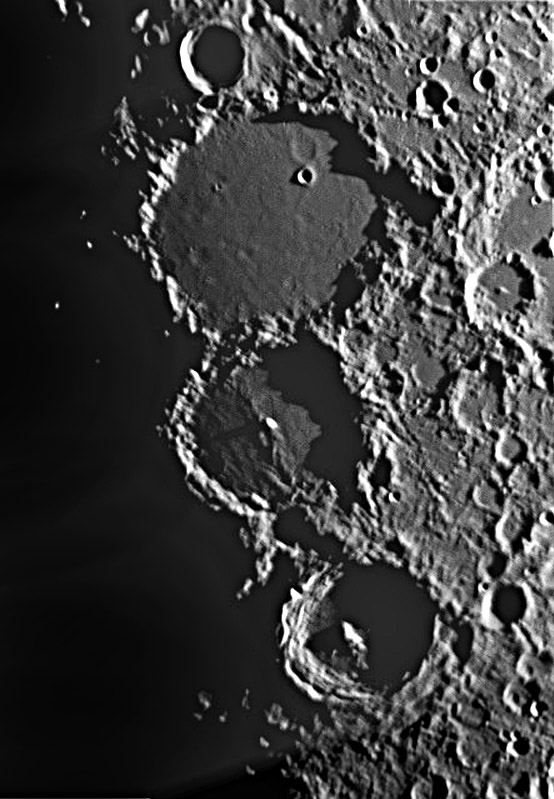Difference between revisions of "May 22, 2013"
| Line 3: | Line 3: | ||
<!-- ws:start:WikiTextHeadingRule:0:<h1> --> | <!-- ws:start:WikiTextHeadingRule:0:<h1> --> | ||
<!-- ws:start:WikiTextLocalImageRule:6:<img src="http://lpod.wikispaces.com/file/view/LPOD-May22-13.jpg/433335524/LPOD-May22-13.jpg" alt="" title="" /> -->[[File:LPOD-May22-13.jpg|LPOD-May22-13.jpg]]<!-- ws:end:WikiTextLocalImageRule:6 --><br /> | <!-- ws:start:WikiTextLocalImageRule:6:<img src="http://lpod.wikispaces.com/file/view/LPOD-May22-13.jpg/433335524/LPOD-May22-13.jpg" alt="" title="" /> -->[[File:LPOD-May22-13.jpg|LPOD-May22-13.jpg]]<!-- ws:end:WikiTextLocalImageRule:6 --><br /> | ||
| − | <em>image by [mailto:gwyckliffe@bellsouth.net | + | <em>image by [mailto:gwyckliffe@bellsouth.net Wyckliffe Hoffler], Titusville, FL</em><br /> |
<br /> | <br /> | ||
| − | Old favorites are always a pleasure, especially when imaged by a first time contributor to LPOD. This low Sun view of the bumps and hollows on the floor of Ptolemaeus joins a [http://www.astronet.ru:8105/db/msg/1200344 | + | Old favorites are always a pleasure, especially when imaged by a first time contributor to LPOD. This low Sun view of the bumps and hollows on the floor of Ptolemaeus joins a [http://www.astronet.ru:8105/db/msg/1200344 series] of [http://www.lpod.org/?m=20060406 earlier] [http://www.lpod.org/archive/archive/2004/03/LPOD-2004-03-03.htm views]with slightly different illuminations. As I often do, I enhanced Wyckliffe's original image beyond what is reasonable for best tonal depiction in order to emphasize the subtle floor topography. With the LRO [http://target.lroc.asu.edu/da/qmap.html?mv=eqc&mcx=-33874.61078&mcy=-247491.02732&mz=7 QuickMap] we can now measure some of the saucers on the floor. The largest and most often seen, Ptolemaeus B at top right on the floor just above Ptolemaeus A, is 16 km wide and 170 m deep, with a rim elevated about 20-40 m above the surrounding. As discussed before, the saucers are probably both primary and secondary impact craters covered by Imbrium ejecta. If "B" were originally the same shape as 16 km wide [http://the-moon.wikispaces.com/Birt Birt] its rim would have been about 800 m above the surroundings. So "B" didn't form on the original floor of Ptolemaeus - which would have been about 5 km deep - so it impacted into a much higher level of crater fill. But what would that be? Did "B" form in between the next to last and last ejecta layer from Imbrium? Or was Ptolemeaus nearly filled with lavas, like Plato, before "B" excavated a crater, and was then draped by debris from Imbrium?<br /> |
<br /> | <br /> | ||
| − | <em>[mailto:tychocrater@yahoo.com | + | <em>[mailto:tychocrater@yahoo.com Chuck Wood]</em><br /> |
<br /> | <br /> | ||
<strong>Technical Details</strong><br /> | <strong>Technical Details</strong><br /> | ||
Revision as of 18:04, 11 January 2015
Layers of "B"

image by Wyckliffe Hoffler, Titusville, FL
Old favorites are always a pleasure, especially when imaged by a first time contributor to LPOD. This low Sun view of the bumps and hollows on the floor of Ptolemaeus joins a series of earlier viewswith slightly different illuminations. As I often do, I enhanced Wyckliffe's original image beyond what is reasonable for best tonal depiction in order to emphasize the subtle floor topography. With the LRO QuickMap we can now measure some of the saucers on the floor. The largest and most often seen, Ptolemaeus B at top right on the floor just above Ptolemaeus A, is 16 km wide and 170 m deep, with a rim elevated about 20-40 m above the surrounding. As discussed before, the saucers are probably both primary and secondary impact craters covered by Imbrium ejecta. If "B" were originally the same shape as 16 km wide Birt its rim would have been about 800 m above the surroundings. So "B" didn't form on the original floor of Ptolemaeus - which would have been about 5 km deep - so it impacted into a much higher level of crater fill. But what would that be? Did "B" form in between the next to last and last ejecta layer from Imbrium? Or was Ptolemeaus nearly filled with lavas, like Plato, before "B" excavated a crater, and was then draped by debris from Imbrium?
Chuck Wood
Technical Details
17 May 2013, 21:45-22:15 EDT. Celestron 14-inch SC (f/11, 3912mm) + Lumenera 070M camera; from a 13 frame mosaic processed them in Registax, and stitched the finals together with PS Elements.
Related Links
Rükl plate 44
21st Century Atlas chart 17.



